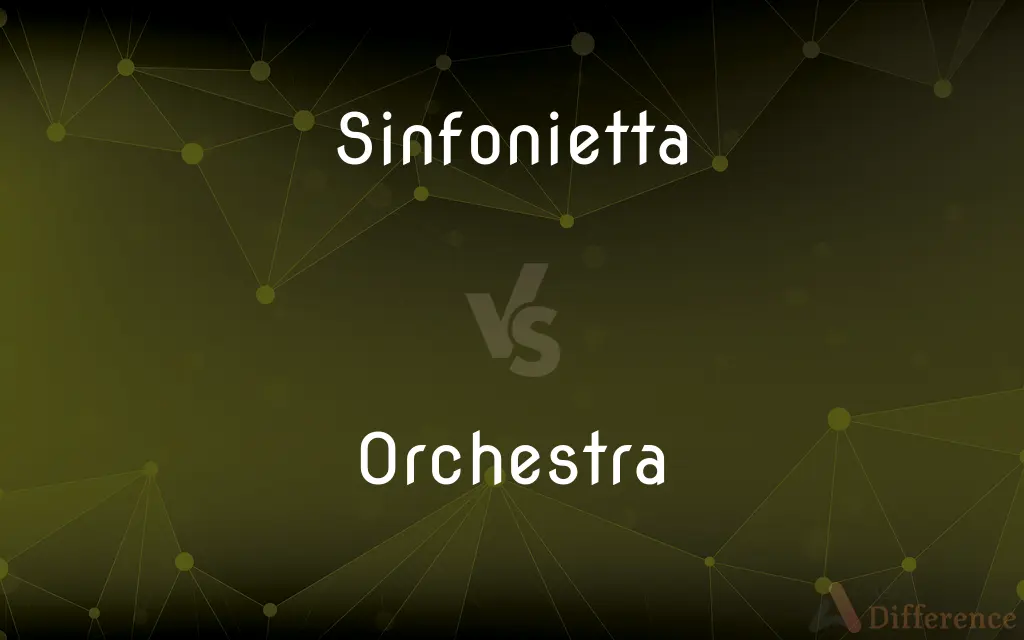Sinfonietta vs. Orchestra — What's the Difference?

Difference Between Sinfonietta and Orchestra
ADVERTISEMENT
Compare with Definitions
Sinfonietta
A symphony that is shorter than usual or requires fewer instruments than usual.
Orchestra
An orchestra (; Italian: [orˈkɛstra]) is a large instrumental ensemble typical of classical music, which combines instruments from different families, including bowed string instruments such as the violin, viola, cello, and double bass woodwinds such as the flute, oboe, clarinet, and bassoon brass instruments such as the horn, trumpet, trombone, and tuba percussion instruments such as the timpani, snare drum, bass drum, cymbals, triangle, tambourine, and mallet percussion instrumentseach grouped in sections. Other instruments such as the piano, harpsichord, and celesta may sometimes appear in a fifth keyboard section or may stand alone as soloist instruments, as may the concert harp and, for performances of some modern compositions, electronic instruments and guitars.A full-size Western orchestra may sometimes be called a symphony orchestra or philharmonic orchestra (from Greek phil-, "loving", and "harmony").
Sinfonietta
A small symphony orchestra, especially one consisting of stringed instruments only.
Orchestra
A large group of musicians who play together on various instruments, usually including strings, woodwinds, brass instruments, and percussion instruments.
Sinfonietta
(music) A small-scale symphony (either in length or size of orchestra needed).
ADVERTISEMENT
Orchestra
The instruments played by such a group.
Sinfonietta
(music) A small orchestra.
Orchestra
The area in a theater or concert hall where the musicians sit, immediately in front of and below the stage.
Orchestra
The front section of seats nearest the stage in a theater.
Orchestra
The entire main floor of a theater.
Orchestra
A semicircular space in front of the stage used by the chorus in ancient Greek theaters.
Orchestra
(music) A large group of musicians who play together on various instruments, usually including some from strings, woodwind, brass and/or percussion; the instruments played by such a group.
Orchestra
A semicircular space in front of the stage used by the chorus in Ancient Greek and Hellenistic theatres.
Orchestra
The area in a theatre or concert hall where the musicians sit, immediately in front of and below the stage, sometimes (also) used by other performers.
Orchestra
The space in a theater between the stage and the audience; - originally appropriated by the Greeks to the chorus and its evolutions, afterward by the Romans to persons of distinction, and by the moderns to a band of instrumental musicians. Now commonly called orchestra pit, to distinguish it from the section of the main floor occupied by spectators.
Orchestra
The space in the main floor of a theater in which the audience sits; also, the forward spectator section of the main floor, in distinction from the parterre, which is the rear section of the main floor.
Orchestra
The place in any public hall appropriated to a band of instrumental musicians.
Orchestra
Loosely: A band of instrumental musicians performing in a theater, concert hall, or other place of public amusement.
Orchestra
The instruments employed by a full band, collectively; as, an orchestra of forty stringed instruments, with proper complement of wind instruments.
Orchestra
A musical organization consisting of a group of instrumentalists including string players
Orchestra
Seating on the main floor in a theater
Share Your Discovery

Previous Comparison
Unplug vs. Plug
Next Comparison
Dr vs. Sr














































